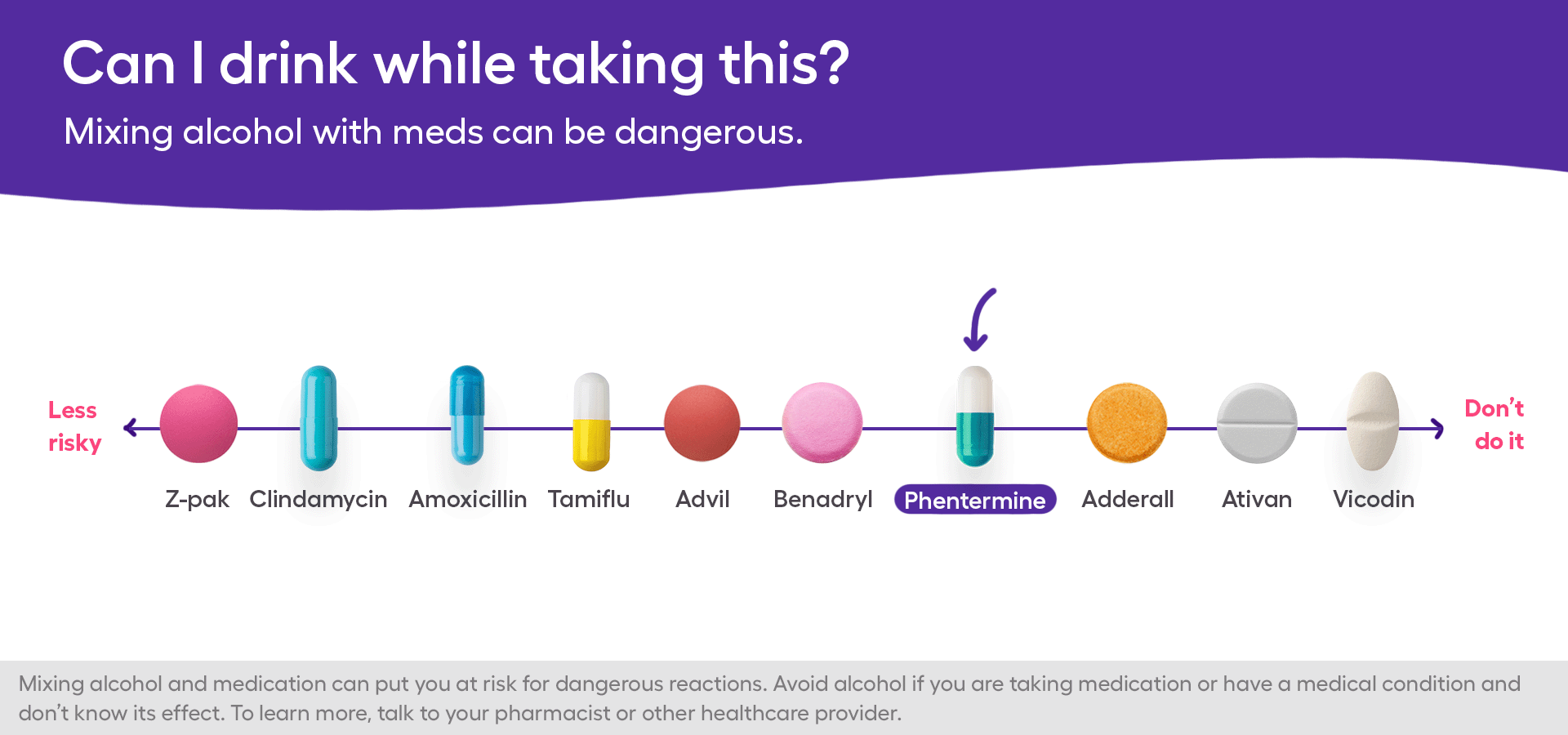Key takeaways
Phentermine is a prescription weight loss drug that should ideally be taken without alcohol to avoid adverse reactions.
Mixing phentermine and alcohol can increase the risk of severe side effects, including cardiovascular issues.
Consuming alcohol while on phentermine can lead to enhanced and potentially dangerous side effects, such as dizziness, headache, and increased heart rate.
Avoiding alcohol entirely while taking phentermine due to its lengthy presence in the system and the heightened risk of side effects is recommended.
Phentermine is a common prescription weight loss drug that is typically prescribed for short-term use. For many people who struggle to manage their weight, it may be a viable option to help shed some pounds when used along with a regime that includes a healthy diet and exercise. If you’ve been prescribed phentermine, you may be wondering whether it’s safe to drink alcohol while taking it.
When taken alone, phentermine already has the potential to cause harmful side effects. Drinking alcohol can heighten this risk and make side effects potentially more severe. Although the extent of phentermine and alcohol interacting can depend on various factors, like how much of each substance is consumed, there is still a risk of side effects with moderate drinking. Even a small amount of alcohol can interact with phentermine.
Continue reading to learn more about mixing phentermine and alcohol and what you should know about the possible consequences.
What is phentermine?
Phentermine, also known by the brand names Adipex-P and Lomaira, is an anorectic drug that helps suppress appetite. It is part of a drug class called sympathomimetic amines. Phentermine is believed to work in various ways, as it has central nervous system (CNS) stimulant effects and helps reduce feelings of hunger.
Phentermine is FDA-approved as a weight loss drug for people with obesity (body mass index (BMI) over 30 kg/m2) or those who are overweight (BMI over 27 kg/m2) with a weight-related condition, such as high blood pressure or diabetes. It is typically taken as a 37.5 mg tablet or capsule once daily in the morning.
Because it is chemically similar to the stimulant drug amphetamine, phentermine is classified as a Schedule IV controlled substance with a small risk of abuse and dependence.
Some people may recognize phentermine as an ingredient of the prescription drug Qsymia, a weight-loss medication that contains a combination of topiramate and phentermine. Topiramate is an anticonvulsant or antiseizure medication that was FDA approved in 2012 to treat obesity when given in combination with phentermine.
Can you drink alcohol while taking phentermine?
In general, it’s not recommended to drink alcohol while taking phentermine due to the risk of cardiovascular side effects, including an increased heart rate or irregular heartbeat. While it’s a good idea to discuss any amount of alcohol use with a healthcare provider when you are taking any medications, the FDA label for phentermine advises against combining phentermine and alcohol because of an increased risk of adverse reactions.

How long after taking phentermine can you drink alcohol?
There isn’t a definitive answer to how long you should wait after taking phentermine to consume alcohol, but it’s generally recommended to avoid alcohol entirely while on this medication. As phentermine can stay in your system for up to 72 hours, you may want to wait at least a few days before drinking alcohol.
If you must drink, keep consumption to a minimum and monitor your body’s reactions, as even a moderate amount of alcohol poses a risk of causing side effects with phentermine.
The consequences of mixing phentermine and alcohol
Mixing phentermine and alcohol could lead to overlapping side effects. As a stimulant drug, phentermine can increase your blood pressure and put stress on your heart. In addition, it may cause gastrointestinal issues and alter your mood and mental state. Alcohol can cause similar side effects, which could lead to amplified side effects of both substances.
Common side effects of mixing phentermine and alcohol
The combination of side effects of alcohol and phentermine is likely to be more severe than the side effects of either substance on its own. The most common of these may include:
- Dizziness
- Insomnia
- Headache
- Nausea
- Vomiting
- Dry mouth
- Constipation
- Euphoria
- Hyperactivity
- Palpitations
- Itching (hives)
- Difficulty concentrating
- Problems with sexual function
- Low sex drive
Severe side effects of phentermine and alcohol
Mixing phentermine and alcohol can also lead to serious side effects, some of which can be life-threatening. These side effects may include:
- Chest pain
- Stroke
- Heart failure
- Heart disease
- Hypertension
- Rapid heart rate (tachycardia)
Serious side effects of mixing alcohol and phentermine are often associated with chronic alcohol abuse—people who drink to excess regularly—although a night of binge drinking could also lead to these effects. People who abuse alcohol or have a history of alcohol substance use disorder are particularly vulnerable to these severe side effects. In addition, mixing phentermine with alcohol may worsen withdrawal symptoms for those undergoing alcohol substance use disorder treatments, such as an inpatient detox program.
It’s important to consult a healthcare provider about medical conditions you have before taking phentermine, as certain conditions increase the risk of these side effects. People with a history of heart disease, an overactive thyroid (hyperthyroidism), glaucoma, agitation, and a history of substance abuse or substance use disorder are not recommended to take phentermine. Consuming alcohol may also affect these conditions, which could increase complications further.
What else should you not mix with phentermine?
Besides avoiding alcohol, you should be aware of other substances that can interact with phentermine. Combining phentermine with other anorectics or appetite-suppressant weight loss medications might lead to additional, potentially dangerous side effects. For example, taking phentermine during treatment with or within two weeks of stopping a monoamine oxidase inhibitor (MAOI) may increase the risk of hypertensive crisis or a severe increase in blood pressure.
People with diabetes may need to adjust their insulin dosage or other antidiabetic medications, as phentermine can affect blood sugar levels. Phentermine may also decrease the blood pressure-lowering effects of certain drugs called adrenergic neuron-blocking agents.
Be sure to inform your healthcare provider of all the medications and supplements you’re currently taking to avoid any drug interactions and reduce the risk of potential complications.
How does alcohol mix with other weight-loss drugs?
Alcohol not only interacts with phentermine but also with other anorectics and weight-loss medications. Alcohol and many weight-loss drugs act on the central nervous system, causing various effects that can be unpredictable and potentially harmful.
Over-the-counter diet pills, in particular, may contain stimulants, such as bitter orange, guarana, and yohimbe, which can be hazardous while drinking alcohol. These stimulants can increase heart rate and blood pressure, which may be amplified while drinking alcohol.
Orlistat, a weight-loss drug also known by the brand name Xenical, is not known to interact with alcohol. This means it doesn’t mix in harmful ways with alcohol as other weight-loss drugs might. Orlistat works by blocking certain enzymes in your digestive system responsible for breaking down fat in your food. Still, eating a meal high in fat and drinking alcohol with orlistat might cause digestive problems, such as diarrhea or gas.
Avoiding alcohol with obesity
The relationship between alcohol and obesity is complex. While moderate alcohol consumption is not typically linked to weight gain, heavy drinking may lead to increased caloric intake, which can cause weight gain. Alcohol may also increase appetite and reduce willpower, leading to overeating, especially unhealthy, high-calorie foods.
Besides its direct effects on caloric intake, alcohol can affect the body’s metabolism, including the processing of fat and sugar. Chronic alcohol consumption can lead to liver disease, which can also affect metabolism and the body’s ability to lose weight.
People struggling with obesity may want to avoid or limit alcohol consumption altogether as part of their weight-loss strategy. Avoiding alcohol may reduce caloric intake and also support making better decisions about food and other healthy lifestyle choices.
Bottom line: Can you mix phentermine and alcohol?
Because of the potential for overlapping side effects, it’s not recommended to mix phentermine and alcohol. Doing so could lead to side effects that range from dizziness and headache to high blood pressure, heart attack, and stroke. In addition, alcoholic beverages may contain extra calories that could counteract the weight-loss benefits of phentermine.
Phentermine should only be taken as advised by a healthcare provider. Consult a medical professional if you have any concerns about taking phentermine with alcohol or other medications.




